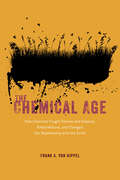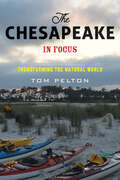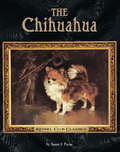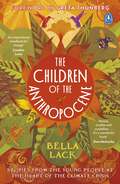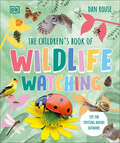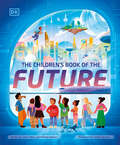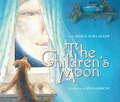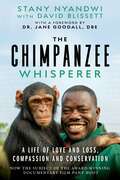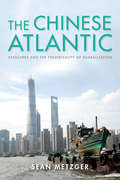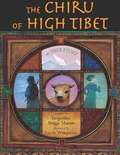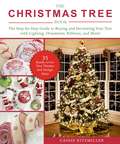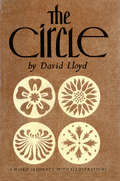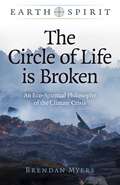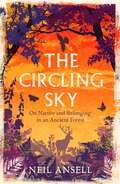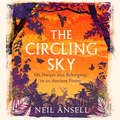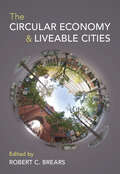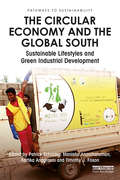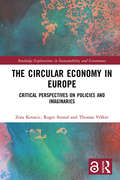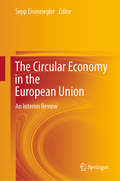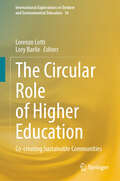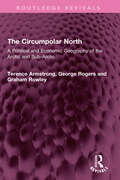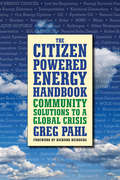- Table View
- List View
The Chemical Age: How Chemists Fought Famine and Disease, Killed Millions, and Changed Our Relationship with the Earth
by Frank A. von HippelFor thousands of years, we’ve found ways to scorch, scour, and sterilize our surroundings to make them safer. Sometimes these methods are wonderfully effective. Often, however, they come with catastrophic consequences—consequences that aren’t typically understood for generations. The Chemical Age tells the captivating story of the scientists who waged war on famine and disease with chemistry. With depth and verve, Frank A. von Hippel explores humanity’s uneasy coexistence with pests, and how their existence, and the battles to exterminate them, have shaped our modern world. Beginning with the potato blight tragedy of the 1840s, which led scientists on an urgent mission to prevent famine using pesticides, von Hippel traces the history of pesticide use to the 1960s, when Rachel Carson’s Silent Spring revealed that those same chemicals were insidiously damaging our health and driving species toward extinction. Telling the story of these pesticides in vivid detail, von Hippel showcases the thrills and complex consequences of scientific discovery. He describes the invention of substances that could protect crops, the emergence of our understanding of the way diseases spread, the creation of chemicals used to kill pests and people, and, finally, how scientists turned those wartime chemicals on the landscape at a massive scale, prompting the vital environmental movement that continues today. The Chemical Age is a dynamic, sweeping history that exposes how humankind’s affinity for pesticides made the modern world possible—while also threatening its essential fabric.
The Chesapeake in Focus: Transforming the Natural World
by Tom PeltonThe people, policies, and forces transforming a national treasure—the Chesapeake Bay.When Captain John Smith arrived in Virginia in 1607, he discovered a paradise in the Chesapeake Bay. In the centuries that followed, the Bay changed vastly—and not for the better. European landowners and enslaved Africans slashed, burned, and cleared the surrounding forests to grow tobacco. Watermen overfished oysters, shad, and sturgeon, decimating these crucial species. Baltimore, Washington, and Richmond used its rivers as urban sewers. By the 1960s, the Chesapeake was dying.A crossroads of life and culture, the Chesapeake straddles the North and the South, mixes salt water with fresh, and is home to about 18 million people and 3,600 species of animals and plants. Although recent cleanup efforts have improved its overall health, they have not been enough to save this national treasure. In The Chesapeake in Focus, award-winning writer Tom Pelton examines which environmental policies have worked and which have failed. Based on Pelton’s extensive experience as a journalist and as the host of the public radio program The Environment in Focus, this sweeping book takes readers on a tour of the histories of the Chesapeake, as well as the ecological challenges faced by its major tributaries. It details the management of blue crabs, striped bass, and other delicious wildlife, profiles leaders and little-known characters involved in the restoration campaign, and warns of the dangers of anti-regulatory politics that threaten to reverse what has been accomplished. Looking to the future, Pelton offers a provocative vision of the hard steps that must be taken if we truly want to save the Bay.
The Chihuahua
by Susan PayneThird in the Kennel Club Books' Classics series, The Chihuahua recognizes the ever-popular pequeño perrito in one spectacular volume. Written by author, breeder, and handler, Susan Payne, this book's engaging chapters on everything from the breed's accomplishments in performance events, to their participation as service dogs make it much more than just "another breed book." With more than 150 vintage and modern photographs of the breed, this book is a must-have for every Chihuahua owner.
The Children of the Anthropocene: Stories from the Young People at the Heart of the Climate Crisis
by Bella Lack'An inspirational manifesto for change' Caroline Lucas, former leader of The Green Party 'A remarkable and important book' Steve Backshall, Naturalist, Broadcaster, and Author'Astute, erudite and crystalline, Bella writes with visionary clarity and passion [...] It's a wonderful book' Dara McAnulty, award-winning author of Diary of a Young Naturalist____________________________Across the planet, the futures of young people hang in the balance as they face the harsh realities of the environmental crisis. Isn't it time we made their voices heard?The Children of the Anthropocene, by conservationist and activist Bella Lack, chronicles the lives of the diverse young people on the frontlines of the environmental crisis around the world, amplifying the voices of those living at the heart of the crisis.Advocating for the protection of both people and the planet, Bella restores the beating heart to global environmental issues, from air pollution to deforestation and overconsumption, by telling the stories of those most directly affected. Transporting us from the humming bounty of Ecuador's Choco Rainforest and the graceful arcs of the Himalayan Mountains, to the windswept plains and vibrant vistas of life in Altiplano, Bella speaks to young activists from around the world including Dara McAnulty, Afroz Shah and Artemisa Xakriabá, and brings the crisis vividly to life.It's time we passed the mic and listened to different perspectives. Bella's manifestos for change will inspire and mobilize you to rediscover the wonders and wilds of nature and, ultimately, change the way you think about our planet in crisis. This is your chance to hear the urgent stories of an endangered species too often overlooked: the children of the Anthropocene. ____________________________'Extraordinarily moving, wild and engaging - the book of the moment' Mary Robinson, Former President of Ireland and author of Climate Justice'A visionary statement for the future [...] Pragmatic, positive & beautifully written' Ben Macdonald, Award-Winning Conservation Writer, Wildlife TV Producer and Naturalist
The Children's Book of Wildlife Watching: Tips for Spotting Nature Outdoors
by Dan RouseGet to know the wildlife in your garden with this handy guide, featuring craft activities to attract and help your outdoor friends.Make a difference to the local wildlife with the ideas and tips in this informative, hands-on book. Help the animals around you by creating a safe place where they can thrive. Discover how important these creatures are to the environment.Activities will help you get up-close to nature in a safe and responsible manner, whether it's by studying creepy-crawlies, pond dipping, or creating a mammal tracker. You can even design your own garden, with tips on planting the right plants to create a safe space for animals.With plenty of advice from the brilliant wildlife expert and TV personality Dan Rouse, this fun yet educational book is a perfect introduction to animal conservation and protection. The Children's Book of Wildlife celebrates local habitats and teaches children about the challenges animals face and what we can do to help. Whether you love nature, enjoy gardening, or simply want to do your bit to help local wildlife, this delightful book is full of practical information and fun activities.Soon you will know all about mammals, creepy-crawlies, amphibians, reptiles, and birds, and their needs. Watch as they visit your local area! How many animals can you spot?
The Children's Book of the Future
by Lavie Tidhar Richard WatsonA Children's Book of the Future is a narrative nonfiction book that will offer an inclusive and hopeful vision of the future, with a diverse, multicultural approach that will appeal to children of all backgrounds and further appeal to the foreign market audience.The book will consist of approximately eighteen chapters that each take inspiration from current scientific research. They'll present engaging, optimistic futures that could result from the real-world science, with insets delving into how that science works. The book will be highly illustrated throughout to make complex ideas more accessible, as well as to better depict the wondrous futures that could be ahead. There will also be a preface, afterword and an activities section.Some of the diverse visions explored include underwater cities; the solar system and space travel; green technologies and sustainability; robots and artificial intelligence; the future of cities; and much more!In short, the book sets out to reclaim the future for current and future generations of children.
The Children's Moon (Digital Read Along)
by Carmen Agra DeedyHave you ever seen the moon on a clear blue day and wondered why?“…Emotive watercolors…The well-told tale works on multiple levels….” --School Library JournalThere once was a time when the sun alone ruled the day, the moon graced the night, and little children were sent to bed before sunset. Then early one dawn, the moon heard sounds of children laughing, and she yearned to see them by daylight."Certainly not!" snapped the sun. "The day is mine. The night is yours!"But the moon had a clever plan...Carmen Agra Deedy and Jim LaMarche have brilliantly crafted an original pourquoi tale about finding one's place in the universe.Now available as a digital read along edition with an included audio recording of the text!
The Chimpanzee Whisperer: A Life of Love and Loss, Compassion and Conservation
by Stany NyandwiA moving, heartwarming memoir about a conservation hero and real-life chimpanzee whisperer—now the subject of the award-winning documentary film Pant Hoot.Stany Nyandwi&’s gift for communicating with chimpanzees is so special that world-renowned primatologist Dr. Jane Goodall has called him a &“chimpanzee whisperer.&” His skills and devotion to these creatures—our closest living relatives, with whom we share 98.7 percent of our DNA—have earned him international awards and sent him on travels within Africa and around the world. But he began life in poverty, born and raised in a dirt-floor, straw-roofed hut in rural Burundi. The Chimpanzee Whisperer is the story of his astonishing life journey.It is also an African story. Receiving only an elementary education before he quit school, he suffered injustice and tragic loss because of his ethnic group. He began caring for orphaned and rescued chimps in Burundi. When the country descended into civil war and genocide, he was forced to flee with the chimps and endured long separation from his family. Continuing to work with and learn about chimpanzees in Kenya, Uganda, and later South Africa, he made himself into an incomparable authority.His memoir has adventure, danger, and many unique and touching stories about chimpanzees that show his bond with and understanding of them. As told to award-winning author David Blissett, it reveals a remarkable man who has refused to let circumstances defeat him. Conditioned by hate, wounded by loss, he has lived for love, faith, and compassion, giving new life, as Dr. Jane Goodall writes in her foreword, &“to so many chimpanzees whose families, like his own, were torn apart by violence.&”
The Chinese Atlantic: Seascapes and the Theatricality of Globalization (Framing the Global)
by Sean MetzgerIn The Chinese Atlantic, Sean Metzger charts processes of global circulation across and beyond the Atlantic, exploring how seascapes generate new understandings of Chinese migration, financial networks and artistic production. Moving across film, painting, performance, and installation art, Metzger traces flows of money, culture, and aesthetics to reveal the ways in which routes of commerce stretching back to the Dutch Golden Age have molded and continue to influence the social reproduction of Chineseness. With a particular focus on the Caribbean, Metzger investigates the expressive culture of Chinese migrants and the communities that received these waves of people. He interrogates central issues in the study of similar case studies from South Africa and England to demonstrate how Chinese Atlantic seascapes frame globalization as we experience it today. Frequently focusing on art that interacts directly with the sites in which it is located, Metzger explores how Chinese migrant laborers and entrepreneurs did the same to shape—both physically and culturally—the new spaces in which they found themselves. In this manner, Metzger encourages us to see how artistic imagination and practice interact with migration to produce a new way of framing the global.
The Chiru of High Tibet
by Jacqueline Briggs MartinThe true gripping story of how scientist George Schaller and four mountain men set out to save the chiru (antelope-like creatures who cannot survive captivity and who live on the high plains of Tibet) from near extinction.
The Christmas Blizzard
by Helen KettemanOld Mr. Jenkins tells Sissy about the year when he was a boy that Santa moved his workshop, elves, Mrs. Clause, and the reindeer and polar bears to their town because it was too hot at the North Pole. The trouble was they couldn't work unless it snowed. Young Maynard Jenkins always followed by his dog, gets a little too much help and after a great wind, it's so icy the reindeer keep falling down. Then the snow starts and doesn't stop. Find out how Santa will be able to make Christmas deliveries and how the town gets a new name. The funny pictures are described. This story is a tall tale.
The Christmas Tree
by Mike SundLittle ones will love this charming holiday tale with a cast of unforgettable characters! It's the perfect stocking stuffer
The Christmas Tree Book: The Step-by-Step Guide to Buying and Decorating Your Tree with Lighting, Ornaments, Ribbons, and More!
by Cassie KitzmillerInterior designer Cassie Kitzmiller shows you how to decorate the perfect Christmas tree this holiday season with step-by-step instructions and beautiful photos for design inspiration! Have you ever found yourself staring at your bare Christmas tree wondering: How many lights am I supposed to put on my tree to prevent dark spots? What exactly is supposed to go on the top and how am I supposed to get it to stay in place? How do I get my tree to look full and beautiful? What should I put on my tree and in what order? What am I supposed to do with all this stuff once the holidays are over? In The Christmas Tree Book, author and interior designer Cassie Kitzmiller pulls from over a decade of professional holiday decorating experience to provide you with everything you need to design your best looking Christmas tree ever! Throughout the book, Cassie shares with you the materials, techniques, and time-saving shortcuts that she uses to design show-stopping trees. Included in The Christmas Tree Book: Choosing between real and artificial treesSelecting a decoration themePicking out ornaments, garlands, tree toppers, and moreClosely-held industry designer secrets! Whether you&’re a Christmas novice starting out on your first tree or a seasoned veteran looking for a bit of inspiration, The Christmas Tree Book has you covered. No matter your skill level, if you&’re thinking of decorating this holiday season, this book is an essential guide to an amazing Christmas tree in your home.
The Circle
by David LloydDavid Lloyd's verses are a genuine contribution to the literature of haiku. They capture an image, a moment in time, and engrave it in the memory for all time.
The Circle of Life is Broken: An Eco-Spiritual Philosophy of the Climate Crisis (Earth Spirit)
by Brendan MyersThe Circle of Life is more than the food web. It's a self-organizing system of global life-cooperation and energy dissipation. Its balance and stability have been taken for granted for millennia. But in the age of the climate crisis, the Circle is breaking down. From the 1960s onward, philosophers, artists and spiritual teachers promoted the idea of the &‘Green Self' to help us understand how the Circle works, and how we harm ourselves when we damage it. But in all that time, the climate crisis only got worse. The Greening of the Self didn't happen. Using the science of ecology and a deep dive into human nature, this book explores what the Circle of Life really is, and what becomes of us when we face it in different ways. The exploration reveals a deeper eco-spiritual perspective, in which the Immensity of the Earth, and the breakdown of the Circle, are calls to action: to heal the Circle, and to create a better world.
The Circling Sky: On Nature and Belonging in an Ancient Forest
by Neil AnsellFrom a 2018 Wainwright Prize shortlisted author, THE CIRCLING SKY is part childhood memoir, blended with exquisite nature observation, and the story of one man's journey over a year to one of the UK's key natural habitats, the New Forest of HampshireIn the form of several journeys, beginning in January 2019, Neil Ansell returns for solitary walks to the New Forest in Hampshire, close to where he was born. With beautiful sightings and observations of birds, trees, butterflies, insects and landscape, this is also a reflective memoir on childhood, on the history of one of the most ancient and important natural habitats in the United Kingdom, and on the Gypsies who lived there for centuries - and were subsequently expelled to neighbouring cities. It is also part polemic on our collective and individual responsibility for the land and world in which we live, and how we care for it.As Neil Ansell concludes so eloquently, 'Evolution has no choice in what it does, but we do, as a species, if not always as individuals'.
The Circling Sky: On Nature and Belonging in an Ancient Forest
by Neil AnsellFrom a 2018 Wainwright Prize shortlisted author, THE CIRCLING SKY is part childhood memoir, blended with exquisite nature observation, and the story of one man's journey over a year to one of the UK's key natural habitats, the New Forest of HampshireIn the form of several journeys, beginning in January 2019, Neil Ansell returns for solitary walks to the New Forest in Hampshire, close to where he was born. With beautiful sightings and observations of birds, trees, butterflies, insects and landscape, this is also a reflective memoir on childhood, on the history of one of the most ancient and important natural habitats in the United Kingdom, and on the Gypsies who lived there for centuries - and were subsequently expelled to neighbouring cities. It is also part polemic on our collective and individual responsibility for the land and world in which we live, and how we care for it.As Neil Ansell concludes so eloquently, 'Evolution has no choice in what it does, but we do, as a species, if not always as individuals'.
The Circling Sky: On Nature and Belonging in an Ancient Forest
by Neil AnsellFrom a 2018 Wainwright Prize shortlisted author, THE CIRCLING SKY is part childhood memoir, blended with exquisite nature observation, and the story of one man's journey over a year to one of the UK's key natural habitats, the New Forest of HampshireIn the form of several journeys, beginning in January 2019, Neil Ansell returns for solitary walks to the New Forest in Hampshire, close to where he was born. With beautiful sightings and observations of birds, trees, butterflies, insects and landscape, this is also a reflective memoir on childhood, on the history of one of the most ancient and important natural habitats in the United Kingdom, and on the Gypsies who lived there for centuries - and were subsequently expelled to neighbouring cities. It is also part polemic on our collective and individual responsibility for the land and world in which we live, and how we care for it.As Neil Ansell concludes so eloquently, 'Evolution has no choice in what it does, but we do, as a species, if not always as individuals'.(P)2021 Headline Publishing Group Limited
The Circular Economy and Liveable Cities
by Robert C. BrearsA practical and interdisciplinary guide to creating liveable, circular economy cities. Practical strategies enhance the book's theoretical exploration of circular economies, providing a solution-oriented perspective on creating more resilient, environmentally sustainable and liveable cities. The chapter authors offer interdisciplinary perspectives on the transformative potential of circular economies when incorporating ecological and social aspects with innovative technologies. The topics covered range from sustainable agriculture and water management to renewable energy and environmental justice. Case studies of cities from around the world promote effective best practices in circular economy implementations across diverse cities, including Tokyo, Singapore, New York, Vancouver, Sydney, the Hague, Barcelona, and Stockholm. This book introduces and discusses the 5R framework - Reduce, Reuse, Recycle, Restore, Recover - as a guiding principle, elaborating its applications across various urban sectors. This book is indispensable for advanced students, researchers, city planners, and policymakers working in urban planning and sustainable development.
The Circular Economy and the Global South: Sustainable Lifestyles and Green Industrial Development (Pathways to Sustainability)
by Patrick Schröder Manisha Anantharaman Kartika Anggraeni Timothy FoxonThe circular economy is a policy approach and business strategy that aims to improve resource productivity, promote sustainable consumption and production and reduce environmental impacts. This book examines the relevance of the circular economy in the context of developing countries, something which to date is little understood. This volume highlights examples of circular economy practices in developing country contexts in relation to small and medium enterprises (SMEs), informal sector recycling and national policy approaches. It examines a broad range of case studies, including Argentina, Brazil, China, Colombia, India, Indonesia, Kenya, South Africa, and Thailand, and illustrates how the circular economy can be used as a new lens and possible solution to cross-cutting development issues of pollution and waste, employment, health, urbanisation and green industrialisation. In addition to more technical and policy oriented contributions, the book also critically discusses existing narratives and pathways of the circular economy in the global North and South, and how these differ or possibly even conflict with each other. Finally, the book critically examines under what conditions the circular economy will be able to reduce global inequalities and promote human development in the context of the Sustainable Development Goals. Presenting a unique social sciences perspective on the circular economy discourse, this book is relevant to students and scholars studying sustainability in economics, business studies, environmental politics and development studies.
The Circular Economy in Europe: Critical Perspectives on Policies and Imaginaries (Routledge Explorations in Sustainability and Governance)
by Zora Kovacic Roger Strand Thomas VölkerThe Circular Economy in Europe presents an overview and a critical discussion on how circularity is conceived, imagined, and enacted in current EU policy-making. In 2013, the idea of a circular economy entered the stage of European policy-making in the efforts to reconcile environmental and economic policy objectives. In 2019 the European Commission declared in a press release that the Circular Economy Action Plan has been delivered. The level of circularity in the European economy, however, has remained the same. Bringing together perspectives from social sciences, environmental economics and policy analysis, The Circular Economy in Europe provides a critical analysis of policies and promises of the next panacea for growth and sustainability. The authors provide a theoretical and empirical basis to discuss how contemporary societies conceive their need to re-organise production and consumption and explores the messy assemblage of institutions, actors, waste streams, biophysical flows, policy objectives, scientific disciplines, values, expectations, promises and aspirations involved. This book is essential reading for all those interested in understanding how ideas about the circular economy emerged historically, how they gained traction and are used in policy processes, and what the practical challenges in implementing this policy are.
The Circular Economy in the European Union: An Interim Review
by Sepp EisenrieglerThe implementation of the circular economy will entail a major transformation from a resource-destroying, linear economy to a circular one that operates within the planet’s regenerative boundaries. This book presents an interim assessment of the implementation of a circular economy in the EU. It reveals what achievements have been made in various EU institutions, but which are scarcely perceived by the public; which basic scientific principles can be applied in this context; and what NGOs are demanding beyond this progress. It provides convincing arguments for abandoning the “hamster wheel” of material-based satisfaction of our needs, and shows that the primacy of the economy stands in the way of a good life for all. Given its focus, it will appeal to everyone interested in an ecologically sustainable economic system.
The Circular Role of Higher Education: Co-creating Sustainable Communities (International Explorations in Outdoor and Environmental Education #2)
by Lorenzo Lotti Lory BarileThis edited volume presents a series of case studies and research evidence on how global students contribute to widening the debate on sustainability within Higher Education institutions: by offering their own stories, along with academics and external stakeholders they create a unique context where their diverse backgrounds are combined into a wider learning experience. This environment enables them to return to their communities and provide leadership and support in tackling real life sustainability related issues they may face. This book describes this circular and virtuous process, which we refer to as Circular Education. Through this process, Higher Education institutions are enriching environments and supporting communities and their cultural hubs. Readers will discover how students can add to and learn from this critical dialogue with peers, academics, and external stakeholders.It is of interest for students, policymakers, academics and any other institution and organization interested in promoting sustainability in Higher Education.
The Circumpolar North: A Political and Economic Geography of the Arctic and Sub-Arctic (Routledge Revivals)
by George Rogers Graham Rowley Terence ArmstrongFirst Published in 1978, The Circumpolar North is designed for anyone with a more than superficial interest in the northern regions of our planet, geographical, economic, social, or political. The primary importance of North today is as a source of raw materials, as a world crossroads, and as a touchstone of the way nations behave towards their minority groups. Strategic considerations have led to the expenditure of vast sums of money; but world population expansion has not yet affected the northlands and their preservation in a natural state is still a feasible objective. The authors are experts in their own areas and have provided regional chapters on each of the land and ocean areas. The book compares the different approaches of the countries involved and deals also, in the context of the northern seas, with another political dimension – the relations between nations and their success in achieving international management of resources. This is an interesting read for scholars of geography, international relations and international economics.
The Citizen-Powered Energy Handbook
by Greg PahlIn the wake of Hurricane Katrina, Al Gore's summer blockbuster "An Inconvenient Truth," and crude oil prices soaring to all-time highs, more people than ever know the truth about our oil addiction. Global warming is here. M. King Hubbert's oil peak is fast approaching (or may already have arrived). The secret's out: fossil fuel reserves are dwindling and popular interest has created the need for accessible, realistic solutions. The Citizen-Powered Energy Handbook, a clear-eyed view of the critical situation we face, offers ways out. Greg Pahl examines energy technologies currently available and homes in on renewable energy strategies that can be adopted by individuals and communities. Such cooperative initiatives have been common in Europe for years and are beginning to gain a foothold in the US. Each chapter focuses on a different renewable energy category-solar, wind, water, biomass, liquid biofuels, and geothermalathen reviews their advantages and disadvantages and describes numerous examples of successful, proven local initiatives. The Citizen-Powered Energy Handbook is an eloquent appeal for community and regional action to initiate an array of solutions to energy needs until now controlled by large, distant utilities and consortiums. It is time to take back control of the energy and environmental challenges ahead; this book will help people do just that. It is a handbook for anyone ready to take the first steps towards a more sustainable future.
